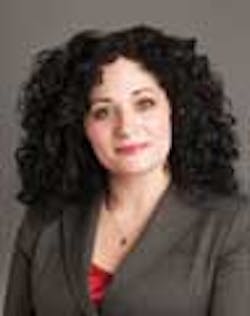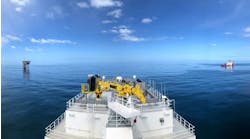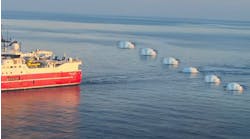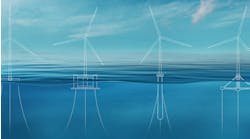BOEM deals final blow to Atlantic permits
The US Bureau of Ocean Energy Management (BOEM) has denied six pending geophysical and geological permit applications to conduct airgun seismic surveys in the mid- and south planning areas of the Atlantic Ocean.
The bureau said that the decision is based on a number of factors, including a diminished need for additional seismic survey information because the Atlantic program area has been removed from the 2017-2022 outer continental shelf oil and gas leasing program.
“In the present circumstances and guided by an abundance of caution, we believe that the value of obtaining the geophysical and geological information from new airgun seismic surveys in the Atlantic does not outweigh the potential risks of those surveys’ acoustic pulse impacts on marine life,” said BOEM Director Abigail Ross Hopper. “Since federal waters in the mid- and south Atlantic have been removed from leasing consideration for the next five years, there is no immediate need for these surveys.”
International Association of Geophysical Contractors President Nikki Martin, National Ocean Industries Association President Randall Luthi, and API Director of Upstream and Industry Operations Erik Milito all responded swiftly via statements to decry the decision.
Martin said it “demonstrates the administration’s continued lack of accountability to the American people. It is also one of many recent and rushed attempts to cater to extreme environmentalists in the last days of the administration, substituting politics for science.”
Luthi said: “This decision continues the Obama administration’s dismissal of scientifically-backed offshore policies and ignores the fact that seismic and other geophysical surveys have been safely conducted offshore in the US and around the world for more than 50 years.”
The BOEM said that additional factors leading to the denials include the possibility that the information would not be used if the Atlantic is not offered for future oil and gas leasing; the acquired data may become outdated if leasing is far in the future; and the probable development of lower impact survey technology before future geophysical and geological information would be needed.
This decision impacts the six permit applications for the use of airgun seismic surveys that were proposed for oil and gas exploration deep beneath the ocean floor.
“Surveys for other, shallow depth purposes typically do not use airguns,” the BOEM said in a statement. “While surveys may have some impacts to marine life, airgun seismic surveys have the potential for greater impacts.”
Martin, Luthi, and Milito dispute these claims, with all believing the BOEM’s decision to be contradictory to its own previous findings.
“Today’s unprecedented denial contradicts what BOEM has repeatedly stated: that there is no scientific evidence that sound from seismic survey activity impacts marine life, nor does it harm the environment,” Martin said. “Rather, it appears the White House directed BOEM to refute the best available science in favor of a precautionary approach with no basis in US law.”
“It’s clear that this is a politically-driven decision that flies in the face of the best available science. As BOEM has reiterated a number of times previously, seismic surveys are a safe, efficient, and scientifically-proven way to find potential new sources of energy,” Milito said.
Martin, Luthi, and Milito all closed their respective statements by expressing that they were looking forward to working with the incoming administration.
“Most of the seismic data for the Atlantic OCS is more than three decades old, and with this decision BOEM seems determined to make sure it remains that way, keeping Americans in the dark for the foreseeable future about the true potential of valuable offshore oil and gas resources that belong to us all,” Luthi said.
Eco seeks AIM listing
Eco Atlantic Oil and Gas plans to seek admission of its shares to trading on the London-based Alternative Investment Market (AIM). The company has exploration interests in frontier basins offshore Guyana and Namibia.
In partnership with Tullow Oil, Eco Atlantic has a 40% stake in the shallow-water 1,800-sq km (695-sq mi) Orinduik block in the Guyana-Suriname basin, adjacent and updip to ExxonMobil’s Liza discovery.
Tullow has agreed to carry Eco Guyana for $1.25 million of a mandatory 3D seismic survey under the initial four-year exploration program. Following the Liza discovery, both parties have agreed to accelerate the defined work program.
In Namibia, Eco Atlantic has stakes in three offshore petroleum licenses in the Walvis basin - Cooper (32.5%), Sharon (60%), and Guy (50%) - with combined prospective resources of more than 2.3 Bbbl net. They cover an area of more than 15,000 sq km (5,791 sq mi) and are adjacent to farm-in activity by companies such as Repsol, Tullow, Murphy, OMV, and Galp.
Eco Atlantic plans to raise £2-3 million ($2.4-3.6 million) before expenses to help enhance its seismic exploration program on the Orinduik block; to progress its work program off Namibia; and to pursue assessment and application for additional license interests in Guyana and other prospective West African basins.
Spectrum begins 3D work off Gabon
Spectrum, in collaboration with the Direction Generale des Hydrocarbures (DGH), has started the first of three multi-client 3D seismic programs offshore Gabon.
Spectrum recently started acquisition of the 10,000-sq km (3,861-sq mi) Gryphon 3D survey off southern Gabon. The survey has attracted industry funding and is expected to be completed in early 3Q 2017. A 5,000-sq km (1,931-sq mi) 3D survey over open acreage in northern Gabon and a 3,000-sq km (1,158-sq mi) 3D survey offshore central Gabon are expected to begin during 1Q and 2Q, respectively.
Gravity and magnetic data will also be acquired. The new data is expected to start becoming available toward the end of 2017 ahead of anticipated licensing rounds.
AAPG, Paradigm collaborate on educational program
Paradigm and American Association of Petroleum Geologists (AAPG) have announced a joint initiative to deliver a continuing education program for AAPG members. In recent years, Paradigm has invested effort in knowledge transfer through a variety of programs, such as its virtual lecture series, Paradigm Online University, Paradigm Education Series (delivered on-site and through webinars) and instructor-led training.
The two organizations have agreed to jointly develop new training programs, to be presented at selected venues. The first collaborative effort was planned for January’s AAPG Workshop for Deepwater and Shelf Reservoirs: Big Data, New Knowledge and Analytics.





